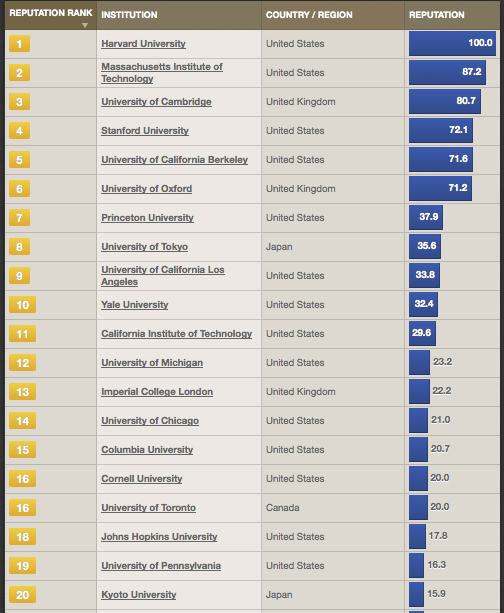You have /5 articles left.
Sign up for a free account or log in.
The 2012 Times Higher Education (THE) World Reputation Rankings were released at 00.01 today by Times Higher Education via its website. It was intensely promoted via Twitter by the 'Energizer Bunny' of rankings, Phil Baty, and will be circulated in hard copy format to the weekly magazine’s subscribers.
As someone who thinks there are more cons than pros related to the rankings phenomenon, I could not resist examining the outcome, of course! See here for a screen grab of the Top 20, with Harvard demolishing the others in the reputation standings.
 I do have to give Phil Baty and his colleagues at Times Higher Education and Thomson Reuters credit for enhancing the reputation rankings methodology. Each year their methodology gets better and better.
I do have to give Phil Baty and his colleagues at Times Higher Education and Thomson Reuters credit for enhancing the reputation rankings methodology. Each year their methodology gets better and better.
But, and this is a big but, I have to ask myself why is the reputation ranking coming out on 15 March 2012 when the when the survey was distributed in April/May 2011 and when the data was used in the 2011 World University Rankings, which were released in October 2011? It is not like the reputation outcome presented here is complex. The timing makes no sense, whatsoever, from an analytical angle.
However, if we think about the business of rankings, versus analytical cum methodological questions, the release of the ‘Reputation Rankings’ makes absolute sense.
First, the release of the reputation rankings now keeps the rankings agenda, and Times Higher Education/Thomson Reuters, elevated in both higher education and mass media outlets. The media coverage unfolding as you read this particular entry would not be emerging if the reputation rankings were bundled into the general World University Rankings that were released back in October. It is important to note that QS has adopted the same ‘drip drip’ approach with the release of field-specific ranking outcomes, regional ranking outcomes, etc. A single annual blast in today’s ‘attention economy’ is never enough for world university rankers.
Second, and on a related note, the British Council’s Going Global 2012 conference is being held in London from 13-15 March. As the British Council put it:
More than five hundred university Presidents, Vice-Chancellors and sector leaders will be among the 1300 delegates to the British Council’s ‘Going Global 2012’ conference in March.
The conference will be the biggest ever gathering of higher education leaders. More than 80 countries will be represented, as leaders from government, academia and industry debate a new vision of international education for the 21st century.
The Times Higher Education magazine is released every Thursday (so 15 March this week), and so this event provides the firms of TSL Education Ltd., and Thomson Reuters with a captive audience of ‘movers and shakers’ for their products, and associated advertising. Times Higher Education is also an official media partner for Going Global 2012.
Make no mistake about it – there is an economic logic to releasing the reputation rankings today, and this trumps an analytical logic that should have led Times Higher Education to release the reputation outcome back in October so we could all better understand the world university ranking outcome and methodology.
More broadly, there really is no logic to the annual cycle of world rankings: if there were, funding councils worldwide would benchmark annually. But there is a clear business logic to normalizing the annual cycle of world university rankings, and this has indeed become the 'new normal.' But even this is not enough. Much like the development and marketing of running shoes, iPods, and fashion accessories, the informal benchmarking that has always gone on in academia has become formalized, commercialized, and splintered into distinct and constantly emerging products.
In the end, it is worth reflecting if such rankings are improving learning and research outcomes, as well as institutional innovation. And it is worth asking if the firms behind such rankings are themselves as open and transparent about their practices and agendas as they expect their research subjects (i.e. universities) to be.
Now back to those rankings. Congrats, Harvard! But more importantly, I wonder if UW-Madison managed to beat Michigan.......oh oh.





